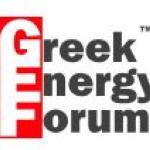
On November 4th, the Greek Energy Forum (GEF) orchestrated an insightful live panel discussion, delving into the intricacies of the latest Middle East developments and their profound implications on the energy markets. Moderated by Stergios Zacharakis, President of GEF, the panel comprised esteemed experts, including Alexandros Lagakos, Panos Mavroeidis-Kamperis, and Konstantinos Zakoulas. The discourse traversed three pivotal axes, illuminating the multifaceted impacts on oil, gas prices, flows, and strategic alliances in the energy sector.
Axis 1: The War in Israel and its Implications on Oil and Gas Prices
The panel initiated by exploring the immediate repercussions of the war in Israel on oil and gas prices. Speakers deliberated on the historical sensitivity of the region to geopolitical tensions and their consequential impact on energy markets. Insights into potential disruptions in oil and gas supply chains and their subsequent influence on global prices were extensively analyzed.
"The risk premia embedded in gas prices due to the Middle East crisis reflect sentiment rather than reason,” Alexandros Lagakos, GEF's co-founder and member of the non-exec board, said.
"Even if there is not an impact on oil supply by the war in Israel, a price premium has been added, due to the geopolitical risk, which is to stay as long as the crisis continues," Konstantinos Zakoulas, Deputy Head of Athens Branch, added.
"Without a structural change, the LNG market seems upset due to the Middle East crisis, where prices hold off a further decrease," Panos Mavroeidis-Kamperis, GEF’s treasurer said.
Axis 2: Short-term and Long-term Variations in Oil and Gas Flows
Beyond the immediate price fluctuations, the discussion unfolded into an examination of the short-term and long-term variations in oil and gas flows. The panelists engaged in a forward-looking assessment, considering geopolitical shifts, technological advancements, and market dynamics that could reshape the flow patterns of these crucial energy resources. Key aspects included potential diversification of supply sources, altered trade routes, and emerging market players affecting global energy dynamics.
"Oil flows are only to be considerably affected if Iran blocks the Strait of Hormuz, which has never happened before. Even the fear for such a development is enough to affect oil markets," Konstantinos Zakoulas, said.
"Egyptian LNG exports have been already absent from the international markets since July, so long before the ongoing crisis started” and "not even under the worst-case scenario of curtailed gas flows could the Israel situation have a noticeable impact on European gas pricing," Alexandros Lagakos added.
Axis 3: Strategic Implications and Changes in Energy Alliances
The panel culminated in a strategic evaluation of the crisis's impact on alliances within the energy sector. Participants probed into potential alterations in the interactions and cooperation among significant stakeholders in the market. Anticipated shifts in geopolitical alliances, collaborations, and investments were discussed, shedding light on the evolving landscape of global energy diplomacy.
The panelists concurred on the complexity of the situation and its potential to significantly reshape the energy sector. Their collective expertise and diverse viewpoints provided a comprehensive understanding of the multifaceted impact of Middle East developments on global energy markets.
The Greek Energy Forum's initiative in orchestrating this insightful panel brought forth a nuanced exploration of the intricate nexus between geopolitics and energy, paving the way for informed discourse and strategic planning in an evolving global landscape.
"In the predicament scenario of more Arab countries getting directly or indirectly involved in the war, the limitation or even termination of LNG flows from the Arab Gulf (which consist 30% of the global supply), won't favor at all the exporters, as it is going to harm their reliability," Panos Mavroeidis-Kamperissaid.
Stay tuned for more updates and in-depth analyses from the GEF as we navigate the dynamic intersections of geopolitics and the energy sector.
*All individuals involved in the GEF are serving under their personal capacity. The analysis and opinions they express through the Forum are their own and do not reflect the view of their respective employers.




